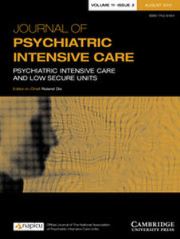Article contents
Psychiatric emergency services in Amsterdam: experience of setting up a temporary admissions unit to manage acute admissions in a metropolitan area
Published online by Cambridge University Press: 10 April 2007
Abstract
Problems in the acute sector of psychiatric care are not unique to the Netherlands and at an international level appear to be linked to problems that are significant for big cities. The search for an “acute bed” had become more difficult and patients were being placed and transported through the whole country. The three mental health care institutions in Amsterdam joined forces and opened a gateway facility in order to confront the pressure on admissions. The object??ive of this facility was to create a buffer for the relief of acute compulsory admissions and thus reduce the period that patients had to stay in police cells and decrease the number of placements outside the Amsterdam region.
In this article the goals, patient groups and achievements of this interim facility, called the Temporary Admission Unit (TOA), are described.
The TOA has proved to be able to fulfil its promise to function as a buffer towards the secure admission units in Amsterdam. For a small group of patients (13%) a short admission period on the TOA is sufficient and they can be discharged immediately. The average occupancy rate of the beds of 5 (out of 8 beds) means that the TOA can usually guarantee availability of beds for acute admissions. Between 2000 and 2002 the number of guest placements outside Amsterdam has drastically lowered, along with a gradual rise in the number of compulsory admissions. Finally, the waiting time in the police stations has been diminished considerably.
The advantages of the TOA are clear. Expensive (nocturnal) ambulance transport can be avoided. The stay in the police cell is reduced and the patient arrives in a facility where psychiatric care is available with greater speed. Contact with a regular therapist and therefore continuity of care guarantees a better situation than when the patient is admitted in a distant facility. The same holds good for family contacts.
Keywords
- Type
- Research Article
- Information
- Copyright
- Copyright © NAPICU 2007
- 2
- Cited by


